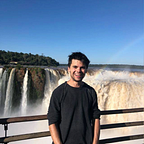Thoughts on The Overstory
I recently finished The Overstory by Richard Powers, a book more different than anything I’ve read in quite some time. It stood out in a bookstore turned cafe with boozy coffee drinks and tasty pastries in Steamboat.
The book follows the lives of ~6 different people and their lineages dating as far back as the 1800s into the present day. Concurrently, it followed the lives and happenings of nature around us, specifically focusing in on trees.
There were moments when these individuals and the nature around them intersected and others when they operated in (pardon my tech language) silos.
It was a little slow at times, but it was well written, moved quickly enough for me, and felt like it was imparting a perspective I kept reaching towards yet never fully grasped.
As a short aside, I find these reviews/reflections helpful in processing the book for myself (rather than just picking up the next one), and I write them publicly for the hope that they resonate with someone else and/or encourage others to read & reflect on reading more!
Life is fickle
Today, we have a greater level (and sense) of control over how we live, our surroundings, and the actions that we take. In the 1800s, where Richard Powers started, people didn’t often have a perceived option for their job except to farm or to work in industry. That dictated a pretty large part of how they spent their time.
Gratitude
Of course, there will always be anomalies, but the extent of freedom and choice that existed 200 years ago pales in comparison with today.
So does our ability to handle accidents (not a hot take). One sickness, or getting stuck with a broken car in a massive snowstorm 50+ years ago would have been far more fatal than today.
Gratitude for the freedom and world we have built around ourselves has become increasingly important and noticeable for me.
Still, life is fickle
Even characters in the modern age of the story had a random stroke, bed-ridding for the rest of their life, or fell out of a tree at a young age, giving them no legs to stand on.
Random accidents ocurred what felt like a unique amount relative to other stories. You never know what crazy thing will happen next, so as much perceived control as we think we have, in many ways, we still don’t (which I kind of love).
Nature has been around for a loooong time
If there was anything that Richard Powers stressed, it was this. 300 or 500-year-old trees growing quietely (to our ears) over generations while we deal with our problems. It makes human life feel rather small, not the center of the universe.
We’re not helping the cause
Also cliché at this point, but this book discussed the impact we’re having on the planet rather objectively. Powers highlighted emotions of the pain for the witnesses and the apathy of contributors.
Without taking a stance one way or another, I haven’t consumed content as moving and human as this on the topic.
There’s much to be learned from the living, and slow-moving things around us
There is this notion carried throughout the book about how much trees, plants, etc do communicate with one another, just not in a way that humans can typically hear.
I couldn’t vouch for the actual science backing the proposed science, but the perspective is interesting nonetheless.
On a personal note, I have found some of my most meaningful, moving, moments to be surrounded by mountains, trying to listen. The 300 year-old-tree and thousands of year old combination of rock and earth have weathered far more intense storms and trials than we.
So, what from here?
Lots of musings and perspectives above that I hope to carry with me even a little bit more each day. If I were to summarize with anything it would be this:
There’s a beauty and a place for grounding within the vast nature that still surrounds us. Human pain, randomness, and love fit into this far larger picture, and when in doubt, go find the biggest tree you can to say hi.
